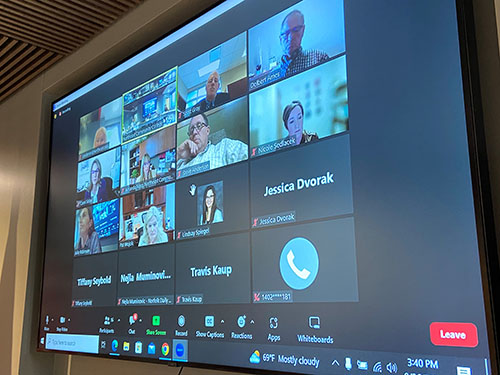NORFOLK, Neb. -- After months of discussions, it was time for action Tuesday afternoon.
The Northeast Community College Board of Governors approved its 2023-24 fiscal year budget, having received more input this year than usual, including a joint public hearing last week.
The board approved a budget that lowers the levy from 9.25 to 9 cents per $100 of valuation, which is .25 lower than last year and lower than was discussed previously. The college has a 2-cent levy for building construction and maintenance included in the 9-cent levy. The college does not borrow funds for construction.
At the public hearing last week, some from the public urged the board to make cuts from what had originally been proposed.
Meeting by Zoom and in person, board members said on Tuesday that they heard the public’s concerns.
Jeff Scheer of Beemer, the county’s at-large board governor, attended four of what have come to be known as “pink postcard” hearings. Northeast officials attended 16 of the 18 hearings held in its 20-county service area, which featured several days when more than one hearing took place.
Scheer said the hearings gave him and board members additional insight into what taxpayers are thinking. And while the college needs to be responsive to students first, it also must be responsive to taxpayers, he said.
Scheer was the board member who suggested lowering the levy. If nothing else, it shows the public the college is being responsive. Additionally, it will reduce the tax asking by about $1 million, Scheer said.
Terry Nelson of West Point said it is a difficult decision because the .25 of a cent is a “token.” In addition, the board had previously believed in having a 9.25-cent levy. While the board wants to be “team players,” it is difficult now to make the cuts, he said.
“I can justify every penny of what we are doing,” Nelson said, noting that there should be some “give and take” with the public.
The board voted both 6-5 on an amendment to lower the levy by .25 of a cent and then again to pass the levy at 9 cents to approve the budgets.
Nelson and other board members said this is the first time in years that there has been a split vote on the budget.
Scheer also said he did not see any benefit to the postcard hearings, considering the cost to mail out the postcards and hold the hearings. One of the women he sat next to at a hearing had about 20 postcards, he said.
“It is a ridiculous waste of money,” he said.
Leah Barrett, Northeast president, said she appreciated all the discussion by board members going back several months. Tuesday’s discussion and all the time the board puts in is not always realized by the public or everyone at the college, she said.
Barrett commended the board members for their willingness to voice their opinions and for being strong stewards. Cutting $1 million is not just about taking it out of the reserves, Barrett said, and will have repercussions, which could impact tuition.
Northeast was required to attend the postcard hearing in Norfolk because it was one of the government entities that exceeded its property tax request by 2%, plus the percentage of real valuation growth.
Northeast budget discussions had been taking place since April when the county sent the first valuation estimate. The board discussed various scenarios for funding, spending hours poring over varying budget possibilities over the past several months.
Julie Robinson, chairperson of the governing board, said the college works to balance the needs of students and the college, weighing needs with the impact on the taxpayers.
Robinson said the board had some tough decisions. Going from 9.25 to 9 cents is going to result in spending more out of reserves.
“I'm not sure at 9 (cents) we solved anyone’s problems,” Robinson said.
Barrett said the college and the board recognizes the challenging times for taxpayers.
“We are responsive to taxpayers and have demonstrated that in recent years, cutting our property tax asking three of the past four years. That simply is not possible this year. We listened to the taxpayers, and we appreciate the challenges they face as well, but we already had stripped the budget down to what was needed.”
Scott Gray, the college’s legal counsel, presented the budget on Tuesday and answered questions for board members.
College officials have indicated that several factors have mandated the increased needs for revenue, including:
· Growth in enrollment in recent years. Northeast’s enrollment rebounded from the pandemic to reach record enrollment.
· Taking care of employees. Northeast is competing with employers in a tight job market and caring for employees is one of the strategic priorities with improvements to compensation and benefit packages and systems.
· Technology improvements, not just keeping up with new industry standards, but ensuring the safety and security of college data.
· The property tax asking includes capital improvements, such as buildings. The college has chosen not to finance new construction with debt financing methods. Therefore, funds must be saved ahead of time for new construction which currently includes replacing the 53-year- old Maclay Building and the expansion of the drafting facilities.
Over the past four years, Northeast’s property tax asking has gone up an average of 1.39%, which is significantly less than the rate of inflation.
The college’s property tax request represents about 5% of the overall property tax bill in the 20-county service area.
This article may be viewed on the Northeast website at:
Cutline Budget
Tuesday’s special budget hearing by the Northeast Community College Board of Governors included a Zoom option, which is unusual since the pandemic.

